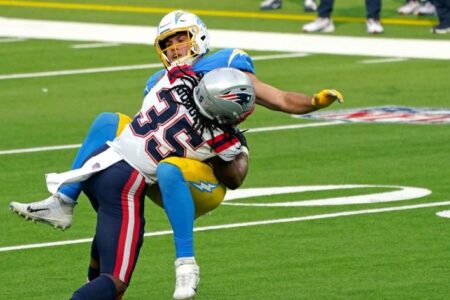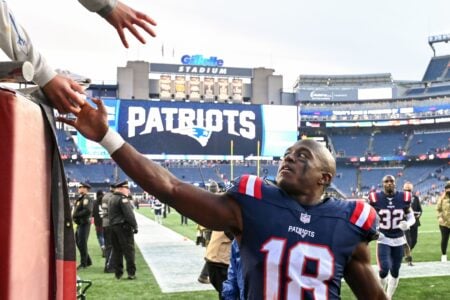The Pats' 16 games had two distinct halves: games 1-8 (before the Colts game), and 9-16 from the Colts game and on.
The team victory, performance numbers... can be proven beyond any statistical doubt that there is a difference between the two episodes (I won't bore you with details how this statistical analysis works, but basically it involves a test to see if the two sets of games belong to the same population or not).
A simple description is that the dominance of victory in the 2nd half of the season is less than that of the 1st half.
The question is what might cause the difference.
This has been discussed throughout, and can be summarized with three hypotheses. What percentage of weight would you put on these:
A- (Tactical reason) In games 9-16, other teams have discovered the Pats' strength/weakness and prepared well for them, thus making the games more competitive.
B- (Psychological reason) The opponents got psyched up to give the Pats their best shots (being underdogs and slighted)
C- (Pats' strategic reasons) Notwithstanding with Brady's desire to "kill teams and blow them out", the Pats began to have agenda and design in these games, in anticipation of the playoff.
D- Other hypotheses?
With this, we just hope to project how the Pats may fare. Right now, the variation is too big (we have 50-80% that the Pats will win all, depending on match-up scenarios).
===========
A footnote: why the Colts' game is the marking point: This was a game in which I was quite off in projecting the Pats winning 10-14 points. Other people argued against all hard-number statistical analyses and pointed to the psychological factor (Hypothesis B): the Colts were undefeated defending champs at home. There could not have been a more dissed home dog. (They won, taking the home dog and the points).
From that game and Buffalo game, other teams could learn what the Colts did (right) and Buffalo did (wrong) and tactically improved their game against the Pats. This is hypothesis A.
The team victory, performance numbers... can be proven beyond any statistical doubt that there is a difference between the two episodes (I won't bore you with details how this statistical analysis works, but basically it involves a test to see if the two sets of games belong to the same population or not).
A simple description is that the dominance of victory in the 2nd half of the season is less than that of the 1st half.
The question is what might cause the difference.
This has been discussed throughout, and can be summarized with three hypotheses. What percentage of weight would you put on these:
A- (Tactical reason) In games 9-16, other teams have discovered the Pats' strength/weakness and prepared well for them, thus making the games more competitive.
B- (Psychological reason) The opponents got psyched up to give the Pats their best shots (being underdogs and slighted)
C- (Pats' strategic reasons) Notwithstanding with Brady's desire to "kill teams and blow them out", the Pats began to have agenda and design in these games, in anticipation of the playoff.
D- Other hypotheses?
With this, we just hope to project how the Pats may fare. Right now, the variation is too big (we have 50-80% that the Pats will win all, depending on match-up scenarios).
===========
A footnote: why the Colts' game is the marking point: This was a game in which I was quite off in projecting the Pats winning 10-14 points. Other people argued against all hard-number statistical analyses and pointed to the psychological factor (Hypothesis B): the Colts were undefeated defending champs at home. There could not have been a more dissed home dog. (They won, taking the home dog and the points).
From that game and Buffalo game, other teams could learn what the Colts did (right) and Buffalo did (wrong) and tactically improved their game against the Pats. This is hypothesis A.


















